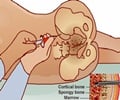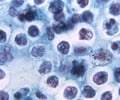A study done by UCLA researchers have discovered a type of cell that is the missing link between bone marrow stem cells and all the cells of the human immune system.

The studies were done using human bone marrow, which contains all the stem cells that produce blood during postnatal life.
The research team was "intrigued to find this particular bone marrow cell because it opens up a lot of new possibilities in terms of understanding how human immunity is produced from stem cells throughout life," said study senior author Dr. Gay Crooks, co-director of the Eli and Edythe Broad Center of Regenerative Medicine and a co-director of the Cancer and Stem Cell Biology program at UCLA's Jonsson Comprehensive Cancer Center.
Understanding the process of normal blood formation in human adults is a crucial step in shedding light on what goes wrong during the process that results in leukemias, or cancers of the blood.
Before this study, researchers had a fairly good idea of how to find and study the blood stem cells of the bone marrow. The stem cells live forever, reproduce themselves and give rise to all the cells of the blood. In the process, the stem cells divide and produce intermediate stages of development called progenitors, which make various blood lineages like red blood cells or platelets.
Crooks was most interested in the creation of the progenitors that form the entire immune system, which consists of many different cells called lymphocytes, each with a specialized function to fight infection.
Advertisement
Previous work had found a fairly mature type of lymphocyte progenitor with a limited ability to differentiate, but the new work describes a more primitive type of progenitor primed to produce the entire immune system, Kohn said
Advertisement
"The gene expression data convinced us that we had found a unique stage of development in the immune system. There was a set of genes that the lymphoid-primed cell shares with the bone marrow stem cells and a unique gene expression of its own once it becomes active. This data provided us with an understanding of what genes are important in creating all the cells of the immune system," said Crooks, a professor of pathology and pediatrics.
"The information could allow us to manipulate bone marrow to help create a stronger immune system," he noted.
The study appeared in the early online edition of Nature Immunology.
Source-ANI










